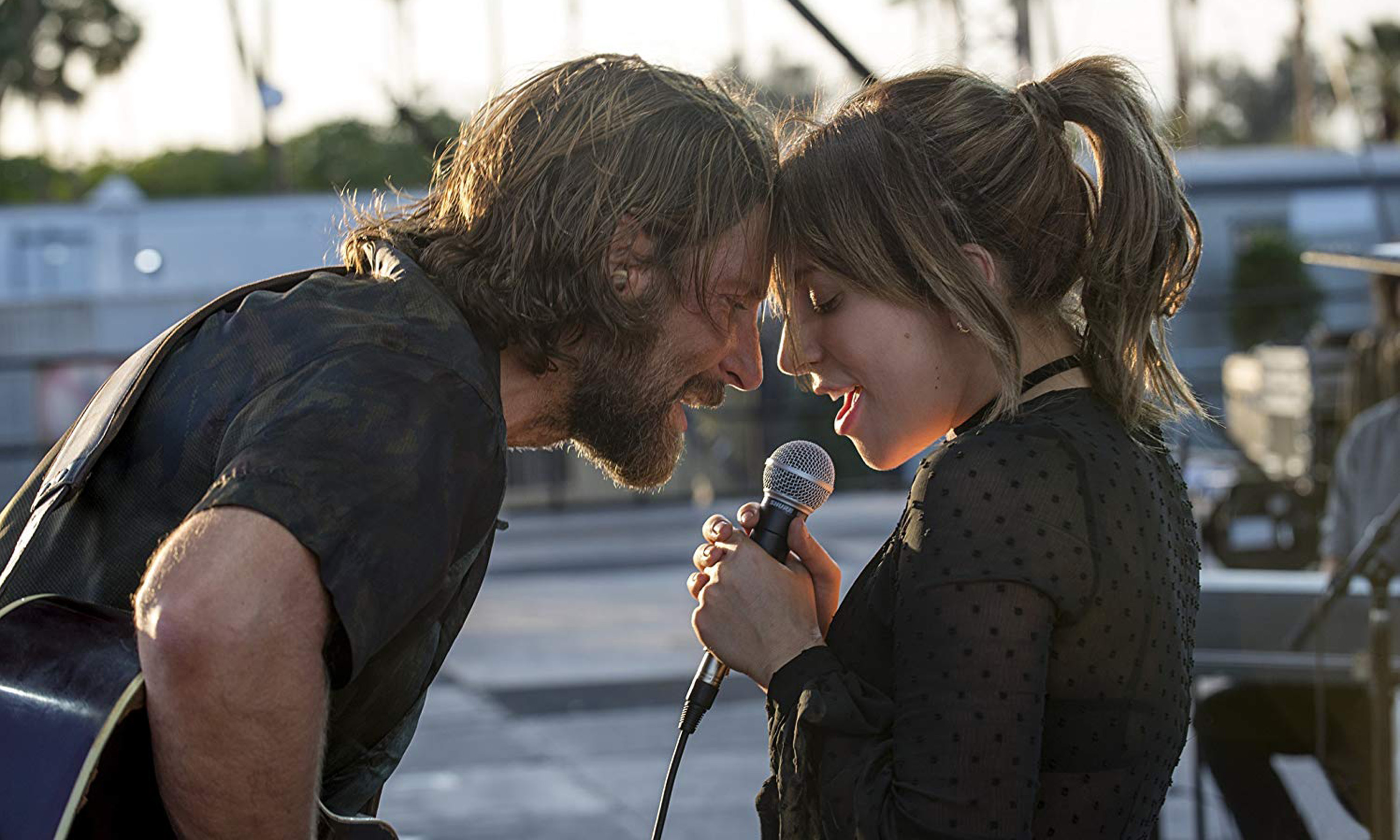
Bradley Cooper and Lady Gaga pluck heartstrings in ‘A Star Is Born’
Written by: Valerie Kalfrin, CC2K Staff Writer
“Talent is everywhere,” says superstar musician Jackson Maine (Bradley Cooper) in the latest iteration of A Star Is Born. “Having something to say, and a way to say it so that people listen to it—that’s a whole other bag.” The third remake of this decades-old Hollywood tale has a lot on its mind about art and fame in the modern age. Yet it also crafts an old-fashioned, touchingly tragic love story thanks to the chemistry and combined talents of Cooper and pop megastar Lady Gaga.
Cooper, a four-time Oscar acting nominee, makes his directorial debut here. He also co-wrote the screenplay with Oscar-winner Eric Roth and Will Fetters. The film borrows—almost to a fault—the basic blueprint of 1937’s A Star Is Born with Janet Gaynor and Fredric March, later adapted into a 1954 musical with Judy Garland and James Mason and a 1976 musical with Barbra Streisand and Kris Kristofferson. In each, an alcoholic male celebrity, somewhat past his prime, plucks a talented woman from obscurity, falls in love with her on her rise to stardom, and implodes once she eclipses him.
Anyone who has seen or known of the other versions knows this match doesn’t end well (a billboard framed near Jack’s head offers a grim omen), but to the film’s credit, it’s entrancing watching it unfold.
Jack shakes pills into his hand before going onstage and swigs liquor afterward. He has a brother (Sam Elliott) who’s almost like a father and a father who died when he was young. A rocker with a hint of country (Lukas Nelson, son of country legend Willie Nelson, and Promise of the Real portray Jack’s band), Jack sings more than once about how “maybe it’s time to let the old ways die.” He can still light up an audience, but he’s losing his hearing, and Cooper plays him with such a shambling physicality that we sense, more than hear, him wondering what more he has left to give.
Seeking a bar before his next gig, Jack wanders into a drag club where Ally (Gaga), a former waitress the performers adore, sings. Gaga plays her as so unassuming that when she belts out Edith Piaf’s “La Vie En Rose,” Jack is enraptured by her pure vocal power. He gladly lets her friend (Anthony Ramos) introduce them, and the film wisely takes its time as Jack and Ally spend the night together. There’s but a kiss on the hand as they talk about music, art and courage, laugh over silly jokes, and understand each other in a way each hasn’t felt for a long time.
Ally has no illusions that she’ll see Jack again. In the morning, she cleans up after her dad (Andrew “Dice” Clay), who runs a car service with his buddies from their house, and dresses for her current waitressing job. But she’s lit a spark in Jack. In a convincing bit of rakish charm and movie magic, he has his driver whisk her to his current show, so he can share the arrangement he wrote for her lyrics and encourage her to sing what touched his soul.
Gaga plays Ally’s world-weary attitude and humility so well that when she cuts loose onstage, Jack and we are transported just watching her. Cooper is an impressive enough guitarist and vocalist, and the performances, recorded live at Coachella, Glastonbury, Stagecoach, and other concert festivals, give the story verisimilitude and an electrifying energy. The supporting cast, including Elliott, Clay, Ramos, and Dave Chappelle, as one of Jack’s close friends, bring understated tension and warmth.
Jack’s substance abuse becomes a handful, something Ally has seen before. Meanwhile, a music producer (Rafi Gavron) hears Ally’s heartfelt piano and imagines her solo as a pop star. The endearingly down-to-earth singer then transforms into…Lady Gaga. In a nice twist, Jack isn’t so much jealous of her success as he thinks she’s wasting her gifts by not being true to herself. He makes a good point, but it’s tough to hear through all the booze.
The script fleshes out Jack so well that Ally seems a cipher by comparison. (Her character doesn’t even have a last name.) We learn what drives his love of music—but what did that for her? She’s knocked around the music industry before, discouraged because no one liked her looks. What were the dreams she had that Jack reignited? And why does she stay when things turn sour?
That’s a flaw in a film that otherwise looks as gorgeous as it sounds, thanks to cinematographer Matthew Libatique, who bathes scenes in reds and blues reminiscent of marquees and stage lights.
Even so, it tugs at the heartstrings plenty, unabashedly embracing the story it wants to tell—like Jack urges Ally to do. “You don’t apologize. You don’t worry about why they’re listenin’ or how long they’re gonna be listenin’ for,” he says. “You just tell ’em what you wanna say.”
